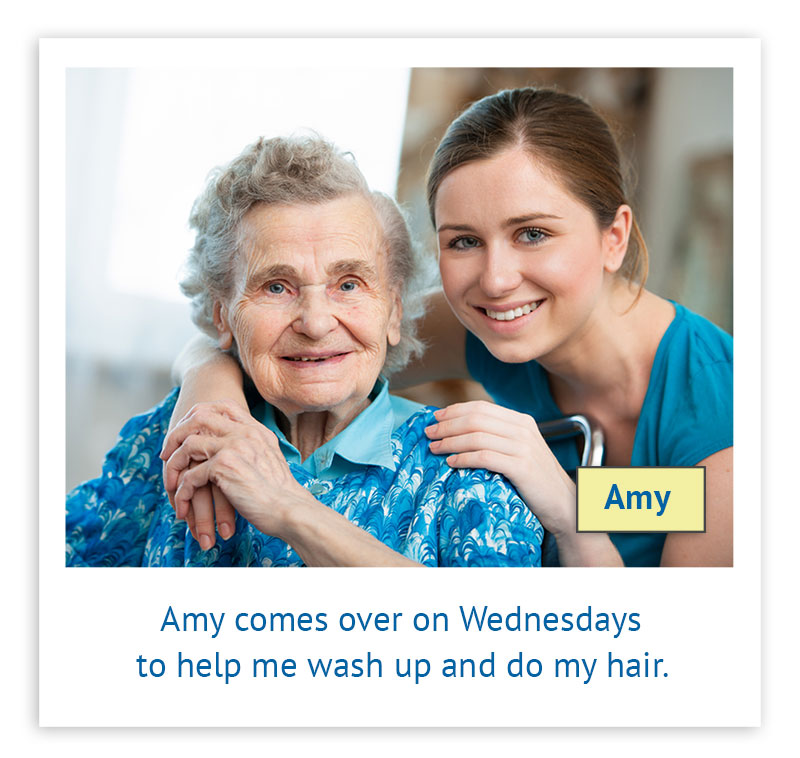Easing the Transition to Hired Care Partners
 Successfully introducing new care partners into the home to support you and your loved one.
Successfully introducing new care partners into the home to support you and your loved one.
Moments We Relate To
Victor desperately needed help caring for his wife, Miriam. Their daughter helped to arrange a home health aide to come in three times a week to help bathe and Dress Miriam and do some things around the house. It was disaster. Usually a kind a gently woman, Miriam was verbally abusive and refused help. Now Victor doesn’t feel that he’ll ever be able to have help in the house. Sound familiar? Would you want a stranger to walk into your home and ask you to take off your clothes and get into the tub? Even though the hired care partner was a nice as could be, Miriam had no past relationship with her and did not understand what was happening. This entire predicament could have been prevented if Miriam had time to get to know the new person on a friendly, social level first. They could have coffee together and chatted. The home health company should have sent the care partner’s photo in advance to Miriam with some information about the person. Then, when it was time for bathing, Victor could have introduced the subject and been present to explain how Miriam likes things, giving special attention to make sure that Miriam has as much privacy as possible.
Sound familiar? Everyone goes through similar challenges, but the way we need to approach them may be different. Let’s get started finding your just right.
Hiring Home Care Help
At some point on this journey, you will probably need to hire care partners from a home health agency or enroll in hospice. It is very difficult to be the sole care partner. Please don’t feel guilty about asking for help. We all need to work as a team, as a community, to support those living with dementia and to support you, the primary care partner. It may be uncomfortable for you to allow strangers into your home and it can be hard for a person with dementia to have someone new in their home, to listen to someone they do not know, and even want help in the first place. How do you know if you have picked the right person? How do you know if a care partner or organization is experienced in dementia?
Hiring Home Care Help Handout – CLICK TO DOWNLOAD PDF | 在这里下载 | ဒီ အီၤ ဖဲအံၤတက့ၢ် | यहाँ डाउनलोड गनुर्होस्
Written by Jennifer Brush, MA, CCC/SLP
Start With These Tips
- Make sure people who interact with your loved one have training in dementia care.
Many organizations will tell you that their staff is trained in dementia care, but often the staff just received a one-hour video training. Ask the agency and any staff to describe the training they have received and discuss with you what they have learned.
- Hire help as early as possible.
Rather than waiting until dementia has progressed for years and the person really needs 24/7 care, start hiring people to help around the house early, even if it is just for a few hours a week. This way the person with dementia gets used to having help at a time when they may be more willing to have help or when their brain can understand the need for help. Consider hiring someone to clean the house once a month, or get groceries delivered periodically. The more routine it becomes to have non-family and friends helping, the easier it is later on when more care is needed.
- Introduce new people into the environment slowly.
Rather than having a hired care partner come in and start helping with bathing and dressing, have a few weeks of visits where they come in and do an activity with your loved one or have a snack together.
- Use memory supports to help create relationships.
Hired care partners are new and can be hard for people to remember. Consider taking a photo of the care partner and the person with dementia together and write the care partner’s name underneath the photo with a brief explanation about why they are in the home.
- Try to be empathetic.
If your loved one does not want help or believes they do not need it, try to understand the emotions behind the reaction. Having help may make them feel like we are taking away their personal control. Have a conversation about how the hired care partner is not only for your loved one but for you as well. Mention how you all need help sometimes and how you would feel a lot better if you got help that you needed. Also let them know that you don’t want to take away their independence or autonomy and that any care partner hired will need to also be someone who helps your loved one be as independent and successful as possible.
- Observe the new care partner and look for these signs of positive interactions:
- Speaking clearly and slowly and not yelling.
- Approaching the person from the front.
- Always letting the person know what they are doing before they do it such as, “I am going to help you get up from your chair now, may I take your hand?”
- Showing your loved one how to do something rather than taking tasks away from them.
- No arguing or confrontation.
- Engaging your loved one throughout the day rather than letting your loved one sit in front of the TV or lie in bed for long periods of time.
- Not trying to prove that what your loved one feels or thinks is wrong, even if it is technically inaccurate.
Make an “About Me” handout for the new care partner that is filled with fun and interesting facts about your loved one.
This will help the new care partner to get to know the person. If the care partner is willing, ask her or him to do the same, so you and your loved one build a relationship with this new member of the care team.
Ideas for the About Me Page
- Favorite foods/foods to avoid
- Hobbies
- Profession
- Favorite and least favorite ways to spend time
- Names of children and grandchildren
- Pets
- Places lived or visited
- Preferred music
- Any special directions about how the person likes to be assisted with personal care
How will you get to know my loved one?
You want your care partner’s first response to be to speak to the person with dementia in order to get to know them. Then they would talk to family and friends who are in the home.
What kind of activities might you do with my loved one?
Hopefully the care partner will say ask what kinds of things your loved one likes to do before they suggest any activities.
If my loved one does not want to get dressed, what might you do?
Look for an answer that reflects observation first. You want your care partner to look into why a behavior is happening and then suggest ways to help. You never want to hear “That happens because your loved one has dementia.”
Hand in Hand at Home
There are simple things you can do to transform your home into a supportive place that helps your loved one with dementia function better. We are going to show you just how to do it.
What is Dementia?
Dementia isn't a specific disease. Instead, dementia describes a group of symptoms affecting memory, thinking and social abilities severely enough to interfere with daily functioning.
Transforming Your Home
The best home environment is one that supports the abilities of the people living there. Small changes in lighting, color, contrast, cueing, clutter, and noise can make a big difference.
Declutter
Understand the negative impact of clutter and take steps to improve the home environment.
Enhance Lighting
Simple changes in lighting can be made in the home to help your loved one function more independently and sleep better.
Support Memory
Create a memory center in your home to reduce confusion and foster wellbeing.
Communicate Effectively
Use a style of communication that is easier for the person with dementia to understand and follow conversations.
Understand Behaviors
Make sense of unexpected behaviors and learn how to prevent them.
Walking About
Tips for understanding and preventing walking about as well as information about how to choose a locating device.
The Power of Choice
Given them every opportunity to make informed choices about their care, leisure time, clothing, food and anything else that affects their life.
Power of Purpose
We all need a reason to get out of bed each day. People with dementia need to know their life has meaning and purpose.
Hiring Home Care
Learn how to ease the transition to additional care partners find out what questions to ask.
Self-Care
Advice for taking care of yourself, learning how and where to ask for help and scheduling breaks from caregiving.
Get Started!
You can do this! Take one step at a time. Follow these steps to get started.



